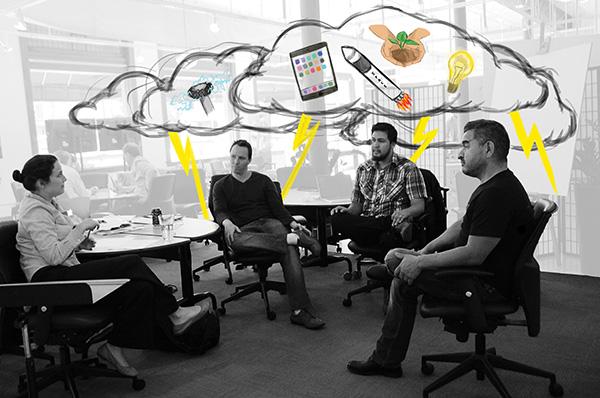Casually dressed employees are strewn about the lobby of what looks like a typical Silicon Valley company. While some recline in ergonomic chairs and type on sticker-covered laptops, others are engrossed in discussion, periodically adding to a colorful idea board. However, unlike similar organizations, this downtown Palo Alto business doesn’t specialize in software security or hardware development. It specializes in analysis and prediction, researching modern trends in our society to help predict and improve our future.
Institute for the Future, or IFTF, has been involved in future forecasting as a nonprofit organization for 45 years, working with sponsors ranging from Fortune 500 companies and the US Federal government, to nonprofits and even individuals. Attracted by IFTF’s extensive track record, the San Jose Unified School District has solicited the help of IFTF, hoping to use their expertise to reinvent the education system for the 21st century student.
The redefinition of education for SJUSD is one of the many different projects that IFTF is currently involved in. By diversifying the topics which they research and forecast, IFTF hopes to develop a comprehensive knowledge of today so they can influence tomorrow.
Alessandro Voto, the research manager for IFTF, is a testament to the diversity of IFTF’s research base.
“Since I have been here, I have worked on the future of food, the future of retail and the future of manufacturing — just a weird combo,” Voto says.
Marina Gorbis, the executive director of IFTF, attributes their varied areas of interest to the inclusive nature of the future.
“We do not have a distinct target population the way that some nonprofits do,” Gorbis says. “We help anyone from individuals to corporations to governments. There are a lot of different stakeholders in the future; it’s hard to commit to just one.”
In addition to their varied clientele, Betina Walburg, IFTF’s Public Foresight Strategist, believes that IFTF is unique because of its hands-on involvement in future forecasting.
“There are a lot of groups that just try to put a stake in the ground about what they think is going to happen,” Walburg says. “What we do here is we try to help people shape their own future. It’s not so much about knowing what exactly is going to happen in the future but rather finding interesting alternatives and working backwards to figure out what you can do today.”
IFTF adheres to this philosophy by concentrating on actionable projects that are relevant to unique aspects of today’s society.
“We did a part of that project looking at extreme learners — people who are hacking into their own education in new ways,” Walburg says. “We did some profiles on different kinds of students and adults and put that on our website … but we are hoping to expand it as a project.”
Through initiatives like the extreme learners project, IFTF has developed a reputation as a pioneer in education. Seeking IFTF’s expertise, the SJUSD recently participated in a workshop facilitated by IFTF over the course of three days.
Jason Willis, the assistant superintendent for the SJUSD, explained that the SJUSD has been working on reforming their education system for several years. However, Willis feels that the ideas produced in this period were not innovative enough to match the unique circumstances of the 21st century student.
“Most people in education understand that the present system is broken and that we are not meeting the needs of people like yourself [students] who walk around with at least seven different pieces of electronics,” says Nathan Cross, a senior associate with Cross & Joftus, an educational consulting firm also partnering with the SJUSD. “We are not really meeting and integrating the needs of different learning styles and creating learning environments that you’ll feel comfortable in.”
Willis believes that IFTF has provided the SJUSD with an environment encouraging unique, viable education reforms.
“Institute for the Future has been the kind of shot in the arm that we really needed to push us to new heights in terms of student engagement and accelerated learning for kids,” Willis says.
During the SJUSD’s three day workshop with IFTF, Willis recounts that through consolidating today’s effective education trends, IFTF provided a comprehensive evaluation of the current state of the education system and the needs of modern students. Willis feels that this knowledge was valuable in the development of new, progressive learning models.
One idea that the SJUSD discussed with IFTF was the idea that students should help take control of their own learning.
“[The idea] completely flips the concept that the teacher has to be the owner of all learning,” Willis says. “It gets students into a situation where they have to be creative. They have to be problem solvers, they have to communicate with their colleagues and work to solve real world problems.”

